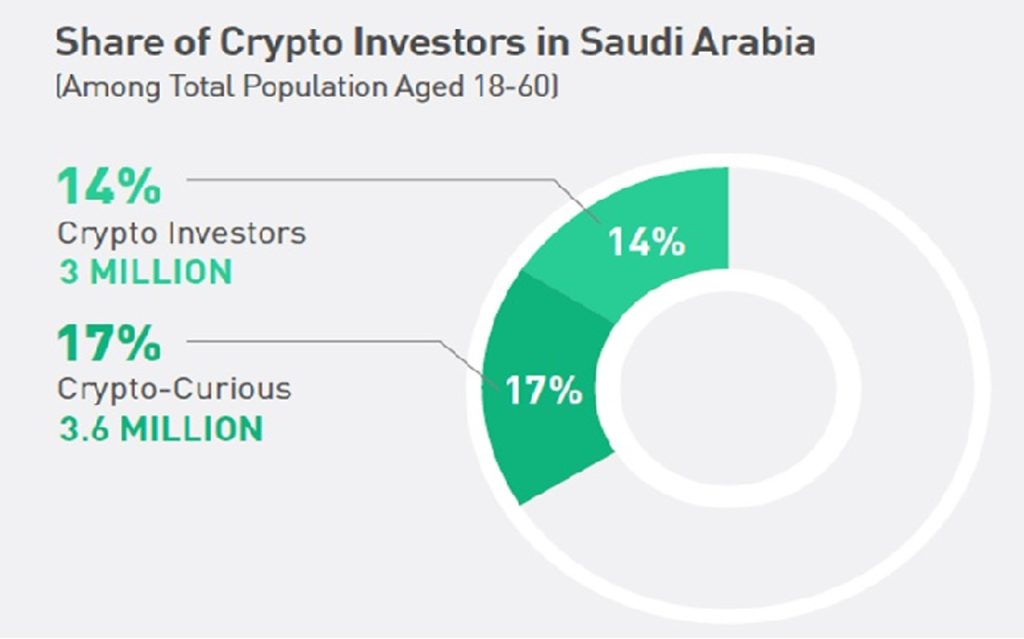
Kucoin cryptocurrency exchange has revealed in a report “ Crypto Verse Report on adoption of digital currencies in Saudi Arabia” that 3 million Saudi Arabians are crypto investors who currently own cryptocurrencies or have traded in past six months. This means 3 million out of an adult population of 21 million or 14 percent currently own cryptocurrencies.
The survey also found that another 17 percent of adult population surveyed, was crypto curious and are likely to invest in crypto in the next six months. This would be mean that by the end of 2022, 31 percent of Saudi adult population or 6.6 million will be trading or owners of cryptocurrencies.

The report’s findings highlight sustainable interest among potential crypto investors in the Arab country. In the first quarter of 2022, 49% of crypto investors intended to increase investment in cryptocurrencies over the coming six months. The onset of the bearish market in the second quarter of 2022 saw a reversal of investor sentiment toward more conservative strategies related to the holding of cryptocurrencies.
In the second quarter of 2022, 31% of crypto owners in Saudi Arabia said that they would keep their crypto balance as is rather than increase their investment. Investors with lower income tended to sell off a part of their portfolios during the same period.
The high proportion of new market entrants is unique to Saudi Arabia, as 76% of crypto investors have less than one year of experience in crypto investment, including 49% of those who first started trading cryptocurrencies in the past six months, suggesting strong demand for crypto education in the market. 51% of crypto investors invest because they believe it is the future of finance, while 44% believe that cryptocurrencies can bring them higher returns in the long run compared to other types of financial investment.
On the demographic side, 63% of crypto investors are men. The gender ratio has remained stable over the past months. In terms of age distribution, young crypto investors below 30 account for at least a third of the total and have increased to 37% in the second quarter of 2022. A slight difference is observed in the mindsets of men versus women, as 44% of male crypto investors say they do not want to miss the trend. On the other hand, women tend to hold a more practical mindset, focusing on realistic benefits. 48% of female crypto investors are motivated by its profitability in the long run, and 42% of females invest in crypto to gain passive income.
42% of Saudi crypto investors say they plan to use the profits to improve their families’ living conditions. Other goals include buying a new house, saving for retirement or emergency fund, and spending on other enjoyments such as traveling and shopping. In addition, 15% of crypto investors hope to live on the income from a crypto investment to be spared from work. Many are using the gains from crypto investment to grow their portfolio and reinvest, especially male crypto investors. 29% of crypto investors plan to start their businesses with gains, and 28% intend to reinvest the money into the financial market.
Social media is the most popular source of crypto-related information, which 84% of crypto investors turn to when doing their research, particularly YouTube and Twitter. Online communities are also important influences for investors. 35% of crypto investors rely on the communities or Telegram for crypto-related information. 32% of investors prefer to consult their families and friends, while others research on their own, seeking information from various sources.
Almost half of crypto investors buy digital currencies using fiat and engage in spot trading every month, which involves trading, buying, and selling on the current market value as the only form of crypto trading that is considered halal by some scholars in the Arab world. Types of investment that involve interests and gambling, such as staking, futures trading, and margin trading, are less popular in the country. As the market goes bearish in the second quarter of 2022, 42% of crypto investors have adopted auto-trading solutions such as trading bots, 7% up from the previous quarter.
Investors search for excellent security and customer service when deciding which crypto exchange to use. The ability to be supported by secure and stable technology is a must-have for 40% of crypto investors, and 36% prefer the promise of repayment in the event of a security breach. In addition, the platforms’ efficient customer service is considered critical by 37% of respondents.
In 2021 Kucoin announced that users were able to buy USDT using United Arab Emirates Dirham through P2P fiat trading with the same for KSA as well.



















